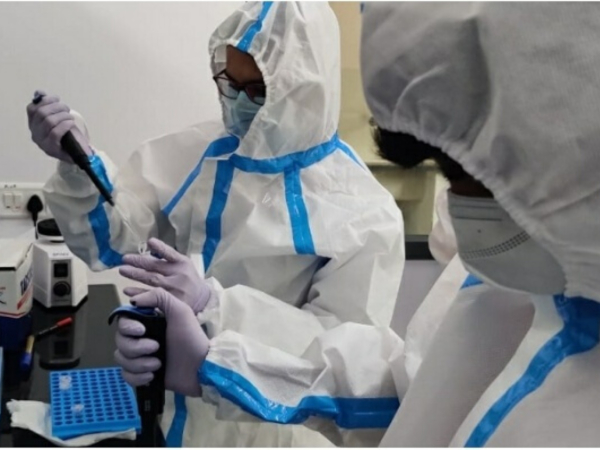Adding low dose pulmonary radiotherapy to the treatment of patients as per institutional protocol, in case of moderate Covid-19 pneumonia patients, has been found to be beneficial in stopping the progression of the disease to severe stage, says research conducted by Patna’s All India Institute of Medical Sciences (AIIMS).
The findings of the interim analysis, specific to the Delta variant of Covid-19, reviewed by Kurtulus Aksu of the University of Health Sciences Atataturk Chest Diseases and Thoracic Surgery Training and Research Hospital, Turkey, and edited by Alessio Bruni of the University Hospital of Modena, Italy, has been published in the Frontiers of Oncology, a PubMed indexed journal, on March 29.
“A whole lung low dose radiation therapy (LDRT) of 0.7 Gy (gray) improved the oxygenation level of patients on day three,” said Dr Pritanjali Singh, the principal investigator, additional professor and head of radiation oncology department at AIIMS-Patna.
“The serum levels of LDH (lactate dehydrogenase, which looks of signs of damage to body tissues), CRP (measures the C-reactive protein level in blood), Ferritin (a blood protein that contains iron and its test helps to assess how much iron the body stores) and D-dimer (used to find out blood clotting disorder) also significantly reduced in 14 days in patients given the low dose radiotherapy in comparison to their baseline value,” she added.
The external oxygen requirement of such patients also reduced, as did the computed tomography (CT) score of their lungs and duration of stay in hospital, said Dr Singh.
Of the 13 patients studied, seven were taken up in the radiation arm and six not given radiotherapy. Those given radiation therapy, along with treatment as per institutional protocol, showed reduced dependence on external oxygen as their oxygenation level improved faster, reducing their hospital stay, as compared to those not given radiotherapy, said Dr Singh, explaining the methodology of the study.
Three patients turned severe among those not given radiotherapy while one patient, having cardiac complications, progressed to the severe stage among those given radiotherapy. There was one casualty in each group, added Dr Singh.
Given the low dose of radiation, she said the possibility of side-effects or patients developing toxicity was negligible over a long-term horizon.
Dr DN Sharma, professor and head, department of radiation oncology of AIIMS, Delhi, said radiation therapy was effective, but to what extent was still not certain because of the small sample size of the study.
“Five to six such studies have now been done, but the sample size has been small, up to a maximum cohort of 40 to 60 patients in any study undertaken in Spain, United States, etc. So, its efficacy if difficult to assess at this stage,” he added.
Dr Sharma, however, did not recommend routine use of radiation therapy in patients with moderate risk of Covid-19 because of the public fear that it may cause cancer over a long-term of say 20 years.
“Radiation therapy makes sense in three cases. First, when someone develops Covid-19 after vaccination; secondly, when other treatments have failed; and when the virus strain changes and the earlier vaccines become ineffective,” said Dr Sharma.
“The advantage of the research is that if in future another wave of the pandemic were to come, unlike the vaccines, low dose radiation therapy will work against all strains of the virus, which has been mutating fast. It is not possible to develop a vaccine for different strains of the virus every year,” he added.
Dr Sharma has now been invited to Denmark’s Copenhagen on May 7 by the European Society of Radiation Oncology to present the findings of his pilot study on low-dose radiation therapy for Covid-19 pneumonia.
At a time when vaccines had not developed, Dr Sharma was the first in India to have done such a study on 10 patients with Covid-19, having moderate to severe risk, from June to August 2020. Nine of his patients, given low-dose radiation therapy, recovered within three to seven days. However, the condition of one deteriorated and the patient died after 24 days of radiotherapy.
Source: HT
You may also like
-
India Against Mpox
-
Combination of ‘Siddha’ Drugs Reduces Anemia in Adolescent Girls: Study
-
Suspected Mpox Case Under Investigation; Patient Put Under Isolation, No Cause for Alarm
-
Prime Minister Applauds India’s Best Ever Performance at the Paralympic Games
-
National Exit Test (NExT) for Ayush to be Effective from 2021-2022 Batch: Union Minister of Ayush Shri Prataprao Jadhav
